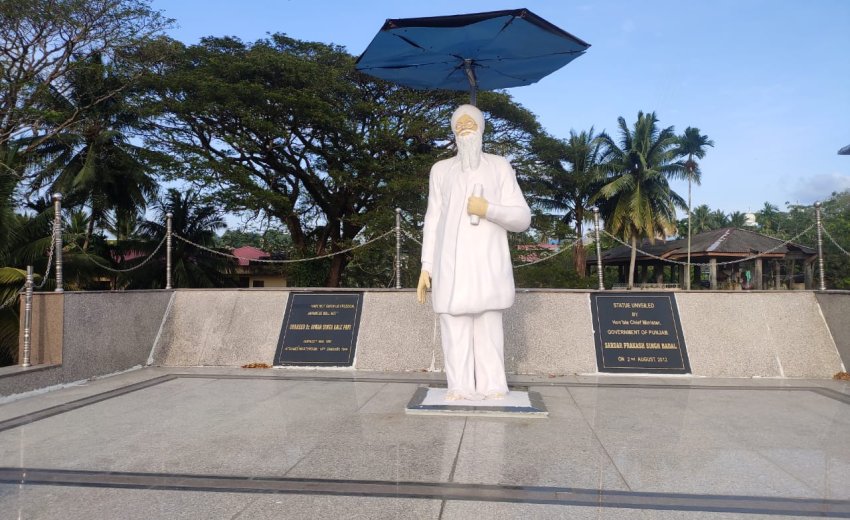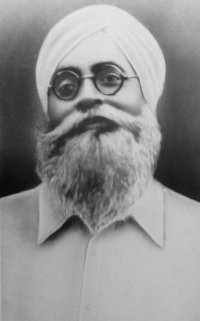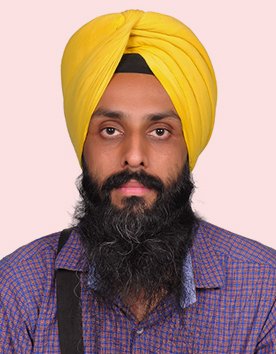The Birth anniversary of Dr. Diwan Singh Kalepani was celebrated on May 22nd. He was one of the leading heroes of the freedom struggle in Andaman. He was also a well known poet and social advocate. This embodiment of compassion and kindness was born on 22 May 1897 in Ghalotian village , Khurd District Sialkot (Pakistan). Orphaned as a child, he was brought up by his maternal uncle and grandmother. He attended middle school at Scotch Mission School Daska, District Sialkot and after passing matriculation from Khalsa High School Sialkot in 1915, he joined Agra Medical College to study medicine. In 1919, Dr Diwan Singh started working in a government job in Rawalpindi, by this time he was married to Inder Kaur. After Rawalpindi, he extended his service to Bannu, Kohat and Waziristan.
Along with medical service, he was also getting exposure to literature. In 1922, he was transferred from Lahore to Dagshai, a hill station. The natural environment there had a deep impact on the poet's mind. His poetry collections 'Wagde Paani', 'Antim Laharen' and 'Malhaan De Ber' became very popular. His poems are related to the subjects of social, economic, religious and political consciousness. Like Professor Puran Singh, he also carried forward the tradition of writing free verse poetry. His masterpiece 'Wagde Pani' has a unique place in Punjabi literature:
"Pani Wagde hee rahan,
Ki Wagde suhande ne,
Khadonde bussde ne,
Ki Pani vagde hee rahan.
Jindaan miliyaan hee rahan,
Ki miliyaan jeendiyaan ne,
Vichhadyaan maradiyaan ne,
Ki jindaan miliyaan hee rahan."
He was also greatly influenced by Mahatma Gandhi's 'principle of non-violence'. During a rally in Dagshai itself, Dr Diwan Singh called for a boycott of the visit of the Prince of Wales's eldest son to India, Later he was prosecuted for speaking against the British Empire, But he was acquitted due to lack of witnesses, but he was now under the target of the British government because they could not tolerate a government employee speaking against the government.
Hence, Dr Diwan Singh was transferred to Rangoon-Burma, after which, he was appointed as a doctor at 'Dundas Point' in Andaman Islands in 1925. After this, on 20 October 1927, he was given the charge of Cellular Jail Hospital. There he witnessed how police authorities discriminated common people. Even the Gurdwara there was reserved for the Sikh policemen and the presence of ex-convicts was frowned upon. Public addressing was prohibited at that time, Compassionate as he was, Dr. Diwan Singh decided to build another Gurdwara Sahib in 1937 to unite the people and make them aware of their rights.
People of all religions were included in the committee of this Gurdwara Sahib. Arrangements were made to learn Punjabi, Hindi, Tamil, Bengali, Urdu and English languages in this Gurudwara Sahib. A book house was built here in which 36 daily, weekly and monthly newspapers of many languages were ordered. On 27th November 1948, to recognise the efforts and sacrifices made by Dr. Diwan Singh Kalepani for truth and righteousness, the new Gurudwara was renamed in his honor as 'Dr. Diwan Singh Gurudwara; this important decision was announced in Sangat by Jathedar Sri Akal Takhat Sahib Sardar Mohan Singh Ji, who was on a visit to the island. The historic Dr. Diwan Singh Gurudwara is perhaps the only Gurudwara in the world to be named after a person other than Sikh Gurus.
His poetry collection 'Wagde Paani' was published in 1938 comprising fifty-one poems. In these poems, Dr. Diwan Singh Kalepani presented the concept of vastness and openness to the people trapped in the narrow mindedness of society. Similarly, the second poetry collection 'Antim Laharen' was published in 1964, almost twenty years after his martyrdom. In which his unique poetic talent emerges before us with 37 emotional poems. 'Malhaan De Ber', published in 1986, contains 67 poems.
He had studied Gurbani deeply. Following the teaching of Ten Gurus he revolted against repression and injustice. Dr. Diwan Singh continued his collected services and became the President of the Indian Independence League in April 1942. When the Japanese captured the Andaman and Nicobar Islands on March 23, 1942, Dr. Diwan Singh raised his voice against the atrocities being committed by the Japanese on the common people and when the Japanese officers wanted to accommodate the Korean girls brought to fulfill the physical desires of the Japanese soldiers in the Gurdwara Sahib, Diwan Singh ji strongly opposed it. As a result, his unwavering commitment to justice led to his arrest on October 23, 1943, on false charges of being a British spy. During his imprisonment in Wing No. 6 of the Cellular Jail, Diwan Singh had to endure 83 days of brutal torture. He was Hung upside down, given electric shocks, forced to sit on a steel chair with fire burning below but he remained steadfast on the path of truth!
Ultimately, on the day of Maghi on 14 January, according to Gurbani's Mahavaak "Tera Bhana Meetha Laage", he was martyred on the land of Kala Pani while raising his voice against the atrocities . A modern museum has been built in the memory of Dr. Kalepani by his family at Siswan on Chandigarh-Baddi Road. The life of Dr. Diwan Singh Kalepani will always be a beam of light for the generations to come. This great hero of Andaman's freedom struggle truly deserves an honorable place in our sagas!



